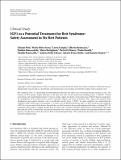IGF1 as a Potential Treatment for Rett Syndrome: Safety Assessment in Six Rett Patients
Author(s)
Pini, Giorgio; Scusa, Maria Flora; Congiu, Laura; Benincasa, Alberto; Morescalchi, Paolina; Bottiglioni, Ilaria; Di Marco, Pietro; Borelli, Paolo; Bonuccelli, Ubaldo; Della-Chiesa, Andrea; Prina-Mello, Adriele; Tropea, Daniela; ... Show more Show less
DownloadAURT.2012.679801.pdf (2.543Mb)
PUBLISHER_CC
Publisher with Creative Commons License
Creative Commons Attribution
Terms of use
Metadata
Show full item recordAbstract
Rett syndrome (RTT) is a devastating neurodevelopmental disorder that affects one in ten thousand girls and has no cure. The majority of RTT patients display mutations in the gene that codes for the methyl-CpG-binding protein 2 (MeCP2). Clinical observations and neurobiological analysis of mouse models suggest that defects in the expression of MeCP2 protein compromise the development of the central nervous system, especially synaptic and circuit maturation. Thus, agents that promote brain development and synaptic function, such as insulin-like growth factor 1 (IGF1), are good candidates for ameliorating the symptoms of RTT. IGF1 and its active peptide, (1–3) IGF1, cross the blood brain barrier, and (1–3) IGF1 ameliorates the symptoms of RTT in a mouse model of the disease; therefore they are ideal treatments for neurodevelopmental disorders, including RTT. We performed a pilot study to establish whether there are major risks associated with IGF1 administration in RTT patients. Six young girls with classic RTT received IGF1 subcutaneous injections twice a day for six months, and they were regularly monitored by their primary care physicians and by the unit for RTT in Versilia Hospital (Italy). This study shows that there are no risks associated with IGF1 administration.
Date issued
2012Department
Massachusetts Institute of Technology. Department of Brain and Cognitive Sciences; Picower Institute for Learning and MemoryJournal
Autism Research and Treatment
Publisher
Hindawi Publishing Corporation
Citation
Pini, Giorgio, Maria Flora Scusa, Laura Congiu, Alberto Benincasa, Paolina Morescalchi, Ilaria Bottiglioni, Pietro Di Marco, et al. “IGF1 as a Potential Treatment for Rett Syndrome: Safety Assessment in Six Rett Patients.” Autism Research and Treatment 2012 (2012): 1–14.
Version: Final published version
ISSN
2090-1925
2090-1933